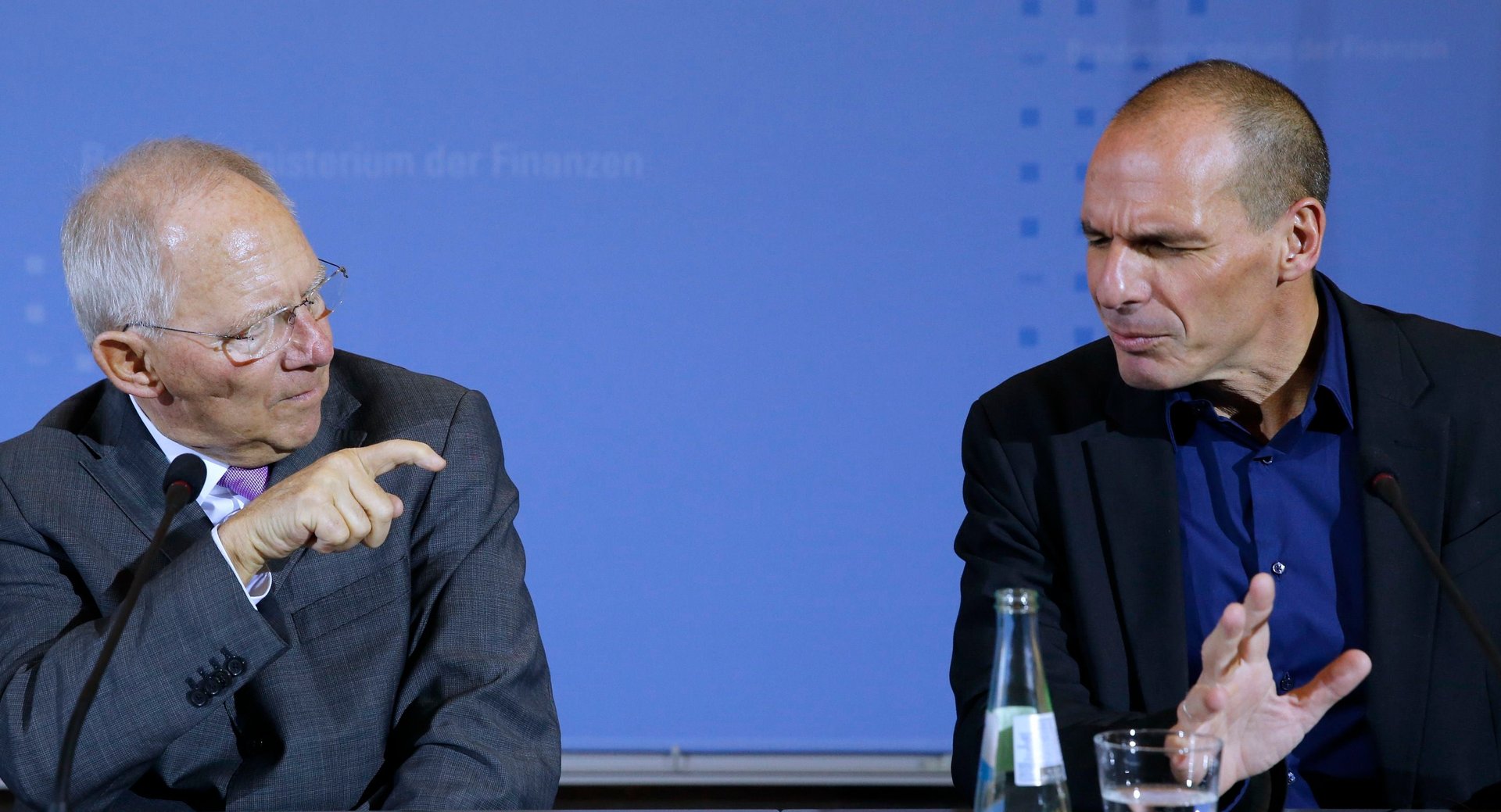The world should listen to Greece’s big idea about debt
Relations between Greece and its euro-zone rescuers reached a new low on Feb. 5. Yanis Varoufakis, the Greek finance minister, announced that he and his German counterpart, Wolfgang Schäuble, could not even “agree to disagree” on how to solve Greece’s ongoing economic crisis.


Relations between Greece and its euro-zone rescuers reached a new low on Feb. 5. Yanis Varoufakis, the Greek finance minister, announced that he and his German counterpart, Wolfgang Schäuble, could not even “agree to disagree” on how to solve Greece’s ongoing economic crisis.
Germany can be forgiven for dismissing much of what the new Syriza-led Greek government says as fantasy. But there’s at least one idea from Greece’s new government that Germany should take seriously.
The austerity and reform program imposed by Greece’s “troika” of lenders—the European Central Bank (ECB), European Commission (EC) and International Monetary Fund—obviously hasn’t been an unalloyed success. It has kept Greece current on its debts, but it hasn’t revived its economic growth. Varoufakis proposes that Greece’s future debt payments be tied to the country’s economic growth.
It’s a simple idea: if Greece grows quickly, its debt payments go up; if Greece doesn’t grow, its debt service falls, even as low as zero. There’s no incentive for the government in Athens to game the economy to avoid triggering debt payments: even a heterodox left-winger like Varoufakis knows that Greece needs to grow if he’s to hold on to his job.
The idea of issuing growth-linked debt is not entirely new. Some economists—including IMF staff members (pdf)—have been touting the concept for years. Recently, the central banks of Canada and the United Kingdom circulated a fresh gloss (pdf) on the idea.
But the few countries that have recently put the concept into practice are not exactly poster children for economic probity. Argentina issued GDP-linked warrants as a bonus for creditors willing to be forced into its hard-nosed “take it or leave it” 2005 debt restructuring. Greece included a similar sweetener in its 2012 debt write-down with private bondholders.
Nonetheless, tying debt repayment to economic circumstance does have a more honorable history. John Maynard Keynes negotiated similar terms (paywall) on a 1946 American loan provided to get post-war Britain back on its feet. Interest payments on the loan were suspended in any year that the UK’s foreign-exchange earnings fell below pre-specified minimums.
This should be the future of how we lend to many countries—especially the very poor 50 or so nations that attract almost no private foreign investment, and vulnerable emerging markets that depend heavily on commodity exports. If more countries converted to issuing growth-linked debt, it would reduce the need for acrimonious debt restructuring negotiations during crises (as in Argentina’s case) or for the equivalent of a bankruptcy court for countries (there currently isn’t one). Instead, when countries run into hard times, their debt payments would automatically be suspended while they sort out their affairs.
Schäuble and Varoufakis ought to be able to reach common ground on tying Greece’s debt payments to the country’s GDP. If Germany truly believes the troika’s policy package will produce growth, there’s no doubt that it and its euro-zone partners will be paid.
However, Schäuble does have a legitimate reason to be skeptical. Growth-indexed debt requires credible GDP data, and Greece’s data aren’t credible. After all, it was the country’s chronic fiddling of its public deficit numbers that touched off this crisis. Greece’s government reacted badly when the jiggery-pokery was revealed: It threw in jail the head of the government statistical office (and former IMF economist), Andreas Georgiou, who revealed the fraud. At the time, Georgiou noted (paywall), “I am being prosecuted for not cooking the books… Unfortunately, in Greece statistics is a combat sport.”
So don’t trust Greek numbers. Instead, end the impasse between Athens and Berlin by stationing a few more EC and IMF economists in the Greek statistical agency. Parachute in a whole flotilla of them, make sure Greek data are sound, and tie Greece’s future debt payments to its economic success. The salaries of these statistical gurus would be nothing compared to the collateral damage that would be wrought if Greece and Germany remain at loggerheads, the troika program lapses, and Athens defaults on its debt.
As Varoufakis recently said to the German paper Die Zeit, “You need not trust us. But you should listen to us.” This is why linking Greece’s debt payments to the country’s growth is such a good idea: no one has to trust the Greeks for it to work.